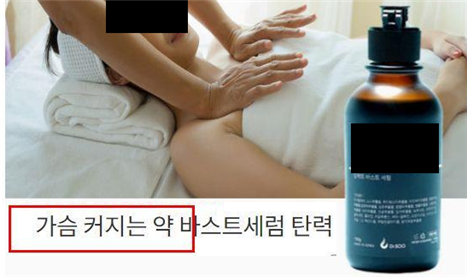
The Ministry of Food and Drug Safety (MFDS) and the Korea Cosmetics Association (KCA) have confirmed 155 violations after examining online advertisements for cosmetics claiming efficacy related to “diet” and “body shape maintenance.”
The MFDS and the association checked 322 cases from July 24 to 28 and requested the Korea Communications Commission to block access and delete posts for violating advertisements.
They also requested administrative agencies with jurisdiction over the companies' locations for inspections and administrative penalties.
The joint inspection was conducted to prevent consumers from being harmed by misleading information, as there are cases where cosmetics are advertised and sold as if they are medicines to prevent or treat diseases, even though they are used to clean and beautify the human body to add attractiveness or maintain and improve the health of skin and hair, the ministry said on Monday.
The violations included 147 advertisements, or 94.84 percent of the total violations, with ad phrases that could be mistaken for medicines, such as “fat decomposition,” “body fat reduction,” “care for inflammation and body fat,” “cellulite destruction,” “cholesterol reduction,” and “discharge of toxins in the body.” Eight advertisements (5.16 percent) that could be misunderstood and confused by consumers outside the scope of cosmetics, such as “proliferation of (chest) fat cells,” “chest enlargement,” “promotion of subcutaneous fat metabolism,” and “double chin lifting.”
The ministry emphasized that it has never reviewed or recognized the efficacy and effectiveness of cosmetics for “diet” or “breast enlargement.” In addition, since cosmetics have a mild effect on the human body, advertisements that claim to improve the body (diet, fat reduction, double chin removal, and breast enlargement) are unfair advertisements that deceive consumers and should not be purchased, it added.
A private advertising verification team run by the ministry also stressed that it is difficult to expect effects, such as “body fat reduction,” “weight loss,” and “permanent cellulite removal” just by using cosmetics with certain ingredients (like garcinia) and that consumers need to be especially careful as no objective scientific evidence has been confirmed.
The ministry operates a private team of 90 external experts from the medical community, consumer organizations, and academia to verify unfair online labeling and advertising of medical products objectively.
"We will continue to cooperate to strengthen inspections and measures against unfair online advertisements so that the public can purchase and use cosmetics with confidence," the ministry and the association said.

